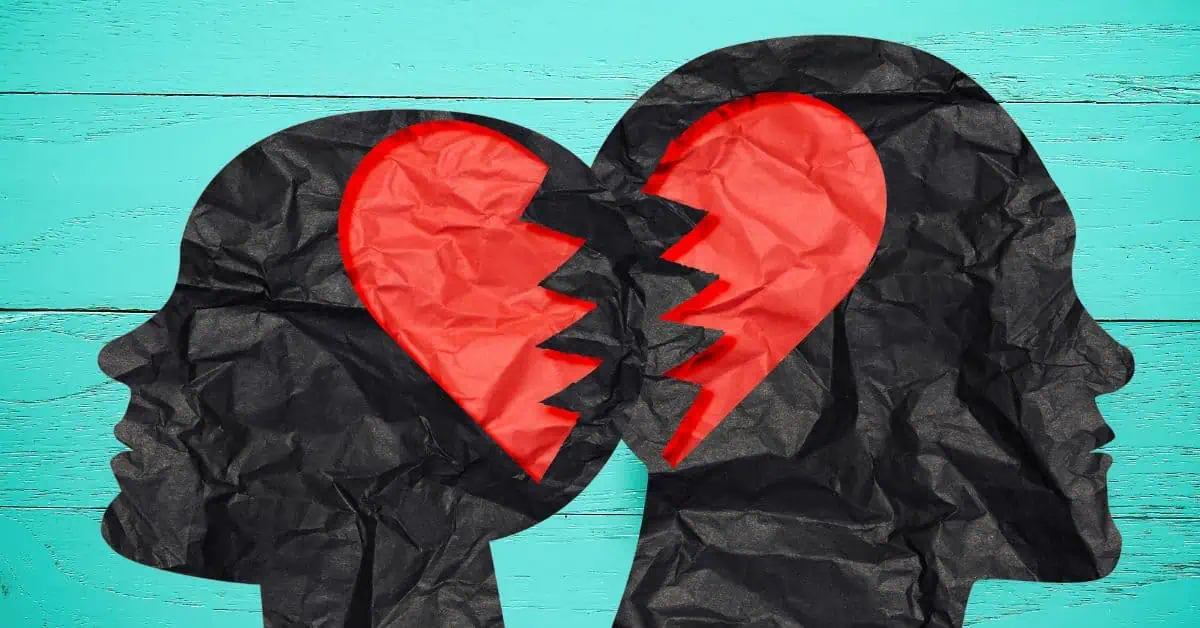Is there anything worse than heartbreak? Don’t answer that! We know there are much worse things, but we aren’t talking about them. We wanna talk about getting your heart stomped all over.
It happens to us all; one minute, you’re in love and everything is good, at least according to your perception. And then the hammer drops, seemingly out of nowhere. Did you miss the signs? Did your partner meet someone else? How did this happen? The questions and the “what if’s” will literally haunt you when you are in the throes of heartbreak.
And although we all experience our heart feeling like it’s been cracked in half by a lobster cracker, how men and women cope with it is very different. Yes, heartbreak is universal but it’s dealt with in completely divergent ways by ladies and gents, and we want to talk about that and find out why!
The Initial Impact of Heartbreak
Heartbreak hits you like a ton of bricks—we swear you can physically feel it. And when it smacks into you, it leaves you reeling. But while the pain is universal, the way it’s handled can be drastically different depending on whether you’re a guy or a gal.
Immediate Emotional Reactions
When that heartbreak bomb explodes, the emotional fallout is instant, but how men and women react is where the paths tend to go can be poles apart.

Men
For men, the shock of heartbreak causes a knee-jerk reaction of trying to keep their emotions under wraps. It’s not that they don’t feel the pain—far from it—but they might try to suppress those feelings, usually because of societal expectations that tell them to “man up” and not show any sort of vulnerability. This tendency to bottle things up inside makes it seem like men are just brushing it off and are totally fine, but the reality is that this emotional suppression can cause the hurt to linger longer, making the healing process longer and way more complicated.

Women
Women, on the other hand, are much more likely to get those emotions out of their body immediately. Crying, talking to friends, or even getting professional help are all ways they cope right off the bat. By expressing their feelings, women are processing the heartbreak more directly, which means they could have a quicker emotional recovery. They’re not afraid to lean on their support systems and get into some serious venting sessions with their girls.
Psychological Responses
Once the first cyclone of emotions has dissipated, the mind starts to take over, and here again, men’s and women’s approaches are usually miles apart.

Men
For guys, denial can act as a powerful coping mechanism. They might bury themselves in work, pick up a new hobby, or even hit the gym with a vengeance (revenge bod, anyone?). These things aren’t just distractions—they’re ways to avoid facing the emotional wreckage left behind by the breakup. Concentrating on external activities may give the impression that they’re moving on, but inside, they’re probably still grappling with a lot of unresolved emotions. It’s not uncommon for men to put off dealing with the heartbreak, sometimes until it sneaks up on them at a later date and when they least expect it.

Women
Women typically take a different route, leaning into the heartbreak rather than avoiding it. They’ll replay everything, analyze conversations to death, and try to figure out what exactly went wrong in the relationship. This introspection is sometimes really intense, but it does help them come to terms with the breakup and start healing. Talking things out with friends or family is also a hallmark for women, as these chats can give them clarity and validation, helping them to process the heartbreak better.
Short-Term Coping Mechanisms
When heartbreak blindsides you, the immediate urge is to find something, anything, that will help dull the ache—men and women will both reach for what’s familiar or comforting, but the ways they deal with the pain tend to be very different. These differences don’t just come out of the blue—they’re rooted in social conditioning, personal habits, and the distinct emotional landscapes that each gender negotiates.
Common Strategies
In the wake of a breakup, the coping mechanisms people adopt are as different as the people themselves, but there are certain patterns that emerge along gender lines.

Men
For men, the aftermath of a breakup is usually about doing everything possible to avoid just sitting with their emotions. Whether that’s throwing themselves into CrossFit, hitting the bars and clubs with their bros, or getting lost in a video game, these things are distractions from the emotional upheaval they’re trying to run from. The underlying goal here is to stay occupied and away from the raw pain. Unfortunately, this can also cause unhealthy habits, like excessive drinking or dabbling in substances, to numb the emotional sting. It isn’t just trying to keep busy—it’s a way to push down the feelings that society tells men they shouldn’t have in the first place.

Women
Women, on the other hand, tend to cope by reaching out to the people they trust the most. We’ll call a friend in the middle of sobbing and try to form words between hiccups. Sharing feelings is a huge part of how women process a breakup—we want to hear we aren’t crazy and have someone else help us make sense of what happened. Yes, we ugly-cry, but don’t mistake our tears for weakness; it’s a release that sometimes makes us feel a little lighter emotionally.
Differences in Social Behavior
The way men and women interact with the world around them post-breakup can look wildly different!

Men
After a breakup, men may pull back from social circles, choosing to keep their feelings to themselves. This withdrawal isn’t just about wanting space—it’s also a defense mechanism. By not talking about the breakup, men may feel like they’re avoiding the pain altogether, though this silence can make the healing process longer or even impossible. There’s a societal expectation that men should be tough, which means it is harder for them to open up, even to their close friends. As a result, men might seem to be moving on quickly, but beneath the surface, the unresolved emotions can linger.

Women
In contrast, women will literally throw themselves at their social circle during tough times. Talking about the breakup with friends or family isn’t solely for words of wisdom or advice—it also helps them feel supported and understood. A communal approach helps them process their feelings, and while it might seem like they’re dwelling on or stuck in the past, it’s actually a way to work through their emotions and begin mending their hearts. Even casual social interactions, like grabbing lunch with a friend, can serve as a reminder that life goes on and that they’re definitely not alone in their suffering.
Long-Term Emotional Healing
“Breaking up is hard to do,” sings Neil Sedaka. But once that dust settles, up next is figuring out who you are now and what you want next! This is where the real work begins. Everyone’s got their own way of getting through it, and men and women take different routes in this department.
Process of Moving On
When a relationship ends, it feels like everything’s out of whack. But as time goes on, the pain will lessen, and that’s when you can start to move forward!

Men
When dudes start to move on, it’s not an overnight thing—it’s a gradual process. Yes, it might look like they are totally okay and haven’t missed a beat in their usual routine, but this is how they deal with and accept the reality. They are working on themselves, just not emotionally—trying to gain control and improve themselves is a way of coping, just not in an emotional way. The idea is to regain some semblance of control and rebuild their lives on their own terms. Over time, as they put the breakup in the rearview mirror, men will accept what’s happened and redirect their energy towards becoming better versions of themselves.
Men also tend to connect through action instead of talking it out like the ladies. They’ll bro out with a guys’ night—could be a poker game, hosting a football viewing at their home, or a boys’ night at the pub. Sure, they might talk about how they feel with their friends, but it won’t be a weep session; they feel better by just being in good company.

Women
Yes, some of us do put on our tiniest dress and hit the club after a breakup, but our hearts aren’t really in it. We want distraction, too! But most of us are self-aware enough to know that it won’t work and, in the end, go full self-care mode. Retail therapy, actual therapy, and making playlists with the saddest songs you’ll ever hear (thank you, Phoebe Bridgers). Most of us are wallowers—we want to channel and feel our emotions. That helps us move on! We need things to make us feel grounded and don’t really care about regaining a sense of control. We feel, we process, and then we can move on.
Changes in Self-Perception
After your heart takes a hit, picking up the pieces and building yourself back up is super important. You have to get your groove back and get to a place where you feel like you again.

Men
Men will sometimes try to rebuild their self-esteem by doing things that make them feel a sense of accomplishment. They want tangible ways to regain confidence and to prove to themselves—and maybe to others—that they’re still capable and strong, despite a banged up heart. A focus on external validation helps them reconstruct their sense of self in a way that feels concrete and reliable.

Women
As for the fairer sex, this period is about rediscovering what really brings them happiness and exploring who they are, independent of their now ex. It’s not just getting over the pain but understanding what they want for themselves going forward. This could be therapy, but it could also be as simple as spending more time on things that make them happy—like hobbies, travel, or even just enjoying being single. By doing the things that affirm their self-worth, women gradually rebuild their confidence and, for the most part, come out the other side a stronger, more assured version of themselves!
The Role of Support Systems
In the midst of heartbreak, the support you get from those around you is a lifeline. However, the ways men and women use these support systems are quite different!
Friends and Family
After a breakup, most people instinctively reach out to those who are closest to them. But the way men and women engage with their loved ones are dissimilar.

Men
Men are more likely to keep discussions with friends and family short and to the point—instead of getting into the intricate emotional weeds, they will seek out advice on what to do next. The conversations can center around the more practical matters like how to move on, whether they should stay friends with their ex, or how to go about daily life post-breakup. For men, this approach feels safer and more manageable because it avoids the vulnerability that comes with openly revealing their feelings.

Women
Women usually take an entirely different approach. They are more likely to have long conversations with friends and family, openly talking about their feelings and asking for emotional support. This doesn’t just help them feel better; it helps them process the breakup. Expressing their thoughts and emotions allows them to gain clarity and gives them comfort of knowing they’re not alone. Friends and family are a sounding board, a touchstone that helps them get perspective of what happened and to start mending their heart.
Professional Help
Ok, so professional help has long been taboo for the stronger sex, but that is slowly changing! While it’s not in the past, getting help from professionals for mental health is no longer viewed as “weak,” but that doesn’t mean that men are actively asking for help, so there is a marked difference between men and women in this category as well.

Men
Men are generally less inclined to seek out therapy after a breakup, and this reluctance is directly tied to societal norms that discourage men from showing vulnerability or asking for help. Instead, they’ll attempt to deal with their emotions on their own, using resources like self-help books or online forums. While these can be helpful, they don’t offer the personalized support that therapy does. Some men, however, are beginning to recognize the benefits of therapy and are starting to see it as a valuable tool for working through their feelings and gaining perspective on their situation.

Women
Women are usually way more proactive about seeking therapy after a breakup, and see therapy as an important part of their recovery process, giving them the space to explore their emotions and develop strategies for coping and moving on. Therapy allows women to gain a better understanding of their emotions and to work through the grief in a structured way. This not only helps them heal from the immediate pain of the breakup but also equips them with tools to handle it in the future.
Societal and Cultural Influences
Breakups don’t happen in a vacuum—our responses to them are forged by the world around us—by the norms, expectations, and representations that we’ve absorbed throughout our lives. To understand why men and women handle breakups differently, we have to look at how societal and cultural influences play a role, particularly in the context of gender norms and media representation!
Gender Norms and Expectations
From the moment we’re born, gender norms begin to influence our behavior. These norms dictate how we “should” express our emotions, what roles we should play, and even how we should react when romantic relationships end.

Men
Men frequently face societal pressure to appear strong and unaffected, especially during emotionally challenging times like a breakup. The idea that “real men don’t cry” is still pervasive, and lots of men suppress their emotions rather than openly express them. This pressure can be incredibly damaging, as it discourages men from seeking help or talking about their feelings. A study published in Psychology of Men & Masculinities highlights that men who adhere to traditional masculine norms are less likely to seek emotional support, which can exacerbate feelings of isolation and depression during and after a breakup.
This societal expectation results in men opting to focus on tangible activities that give them a sense of control. Instead of processing their emotions, they will channel their energy into work, physical activities, or new projects. While these outlets can be productive, they don’t necessarily address the underlying emotional pain. Over time, this avoidance can cause unresolved issues to resurface in future romantic relationships.

Women
Women, conversely, have always been encouraged to be more emotionally expressive. Society is way more accepting of women who openly share their feelings and look for support from others. This is beneficial because it allows women to process their emotions more thoroughly, but it also places a certain expectation on them to dwell on their feelings longer than they might naturally do so. The same study from Psychology of Men & Masculinities found that women are more likely to get social support during a breakup, which can facilitate emotional healing but also reinforces gender stereotypes that view women as more emotionally vulnerable.
These expectations are a double-edged sword for women; yes, they find it easier to talk about their feelings and get validation, but they could also feel pressure to engage in behaviors that are seen as “appropriate” for women, like crying or talking about their emotions ad nauseam, even when they’re ready to move on.
Media Representation
The media has always had a heavy hand in shaping how we perceive ourselves and others. The way breakups are depicted in movies, TV shows, and even commercials can reinforce harmful stereotypes about how men and women “should” act when a relationship ends.

Men
In the media, men are almost always portrayed as stoic and resilient following a breakup—they’re shown moving on quickly and using humor or indifference to mask their pain. These portrayals suggest that men should be able to brush off emotional hurt easily, which is an unrealistic expectation IRL. According to a review published in The Journal of Communication, these media representations contribute to the reinforcement of traditional masculine norms, which discourage men from seeking emotional support and perpetuate the notion that men should handle breakups without outwardly displaying vulnerability.
The impact of these portrayals is no small thing—men who internalize these media messages might feel compelled to conform to this ideal, stuffing down their real emotions and delaying or even halting their healing process. The expectation to remain stoic can make it even harder for men to get the help they might need, whether it is from friends, family, or professionals.

Women
Women in the media are pretty much always depicted as being more emotionally affected by breakups. They’re shown sobbing, talking with friends, crying into a pint of ice cream or a comically large glass of wine, or shopping to cope with their sadness. While these portrayals do acknowledge the emotional impact of breakups, they also reinforce the stereotype that women are less resilient than men. The International Journal of Environmental Research and Public Health highlights that these depictions can lead to a self-fulfilling prophecy, where women feel compelled to perform their grief in ways that match up with media-driven expectations, even when they’re over it.
Moreover, the media generally shows women as needing external validation to regain their self-worth after a breakup, which can contribute to unhealthy behaviors like rebound relationships or drastic lifestyle changes. These narratives can make it more challenging for women to navigate their emotions in a real way and find healthier ways to heal.
Tips for Healthy Coping
So your heart is broken. The rug has been ripped out from under you, and you are struggling. Although time is the best cure for heartbreak, we wouldn’t leave you without some solid tips for coping! Below are tailored tips to help both men and women get to the other side!
For Men
Breakups can be particularly tough for men due to societal expectations that discourage emotional expression, but you don’t have to listen to society!
- Acknowledge Your Emotions: It’s important to recognize and accept your feelings, even if they’re uncomfortable. Denying your emotions will only drag out the healing process. Take some time each day to check in with how you’re feeling and allow yourself to fully feel those emotions (we know, that sucks).
- Talk to Someone You Trust: It’s easier to withdraw after a breakup, but talking about what you’re going through with a close friend or family member is incredibly therapeutic. Don’t worry about appearing weak; talking about it will help you process your emotions and get a better perspective.
- Journaling: If talking about your feelings doesn’t come naturally or is impossible for you to do, you can always journal. Writing down your thoughts provides a private, unfiltered space to examine your emotions without any outside judgment. Journaling can also help you understand what you’re going through.
- Establish a New Routine: After a breakup, your life will feel chaotic, so establishing a new daily routine will give you a feeling of order and control. Include things that support your physical and emotional well-being, like regular exercise, healthy meals, and good sleep habits.
- Set Personal Goals: Breakups can be a chance to focus on you! Set some personal or professional goals that give you something positive to work towards. Getting to your goals can boost your confidence.
- Explore New Interests: Picking up a new hobby is a great way to take your mind off the breakup and rediscover what makes you happy.
- Practice Mindfulness and Meditation: Mindfulness practices like meditation can help you stay grounded and manage the stress and anxiety that come with heartbreak—taking a few minutes every day to meditate can make a big difference in how you feel emotionally.
- Spend Time in Nature: Outdoor activities can be incredibly healing. Being in nature has been proven to reduce stress and improve mood, which can be especially beneficial during tough times.
- Avoid Negative Coping Mechanisms: It might be tempting to numb the pain with alcohol, drugs, or other risky behaviors, but these can cause more harm in the long run. Instead, try to focus on healthy coping strategies.
- Rediscover Your Identity: Use this time to find out who you are outside of the relationship. Think about your values, interests, and the things that make you feel happy. This is a great opportunity to rebuild your sense of self and emerge stronger and more confident.
For Women
Women have always been encouraged to express their emotions out in the open, which can be both a blessing and a curse.
- Give Yourself Permission to Feel: It’s okay to feel sad, angry, or confused after a breakup. Let yourself experience these emotions, but also set boundaries for how long you’ll harp on them.
- Connect with Supportive Friends and Family: Lean on your support system, but also be mindful not to over-rely on them or trauma dump. Talking about your feelings is important, but you also need some time alone for self-reflection.
- Engage in Self-Care: Take care of your physical and emotional health through regular self-care practices. This could include anything from taking a girls trip, treating yourself to a spa day, or buying yourself a present like a Birkin Bag (just kidding, don’t do that). Self-care isn’t spoiling yourself; you are reinforcing your self-worth!
- Reflect on the Relationship: Spend some time thinking about what, if anything, you learned from the relationship. What did it teach you about yourself, your needs, and your boundaries?
- Explore Creative Outlets: Channel your emotions into creative activities—creative expression is a good way to process your feelings and turn your pain into something else.
- Stay Active: Physical activity is a great way to lift your mood and reduce stress. Doesn’t matter what it is—yoga or spin classes, or a walk around the block—moving your body will help you feel better both physically and emotionally.
- Practice Gratitude: Even when things feel awful, try to find little things to be grateful for each day. Practicing gratitude can change your focus from what you’ve lost to what you still have.
- Set Boundaries with Your Ex: If you’re still in contact with your ex, you need to set clear boundaries to protect your emotional well-being. If that means limiting communication or cutting it off entirely (we say block them), your healing comes first!
- Invest in Personal Growth: Use this time to concentrate on personal development. Take a class, read books that inspire you, or take up a new hobby.
- Get Professional Support: If you’re struggling to cope, get help from a therapist or counselor. Professional support will give you valuable tools and perspectives to negotiate your emotions and get past heartbreak in a healthy way.
Coping with heartbreak is never, ever, easy, but with a little help, you will mend your heart and you might even be stronger for it! Whether you’re a man or a woman, the trick is to give yourself grace and compassion, have self-awareness, and commit to your emotional and physical well-being.
Summing It Up: Healing in Your Own Way
As cliche as it sounds, time does heal all wounds—even heartbreak. We have all been there at one time or another, and it’s a 0/10 on the rating scale. Knowing how men and women deal with this pain may help you understand why some people appear to bounce back quicker than others—maybe they’re sociopaths! Jk, jk; they are most likely just hiding that they are hurting.
Understanding the different ways men and women handle heartbreak means we can give the right kind of support! Encouraging men to express themselves or helping women balance their emotions, recognizing the differences makes us better at helping someone heal—heartbreak can be a little less lonely.
How do you cope with heartache? Do you have a secret way that will help others heal faster? Tell us in the comments! And don’t forget to actually deal with your heartbreak in a healthy way; repressing it or trying to drink it away does more damage in the long run.
